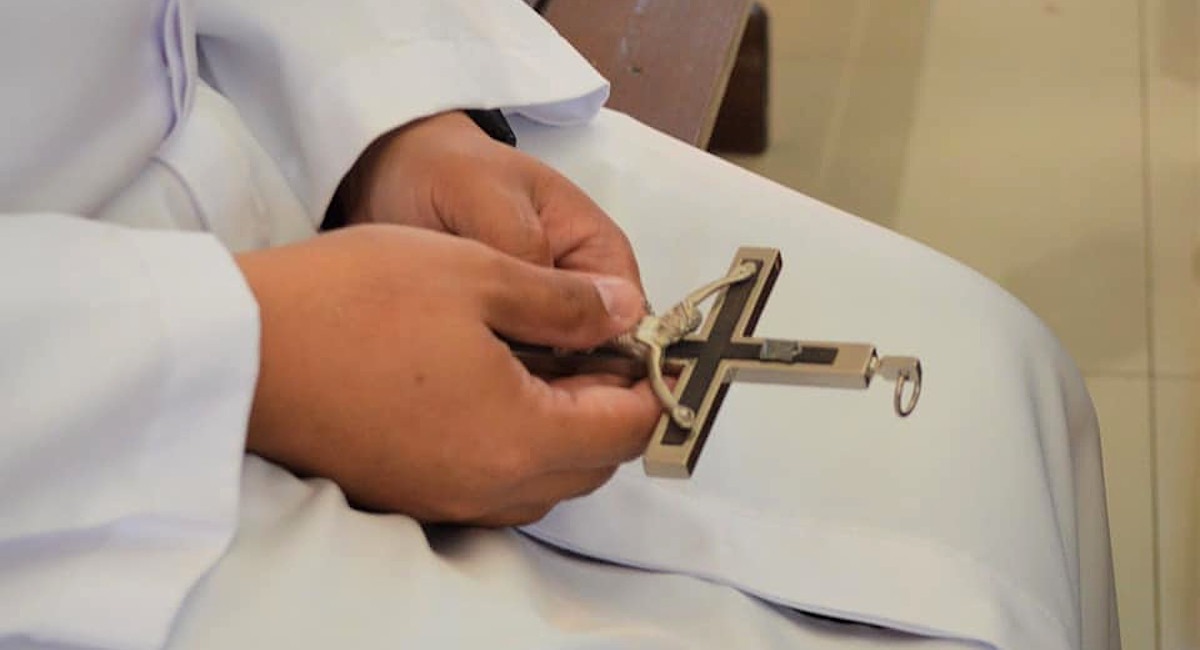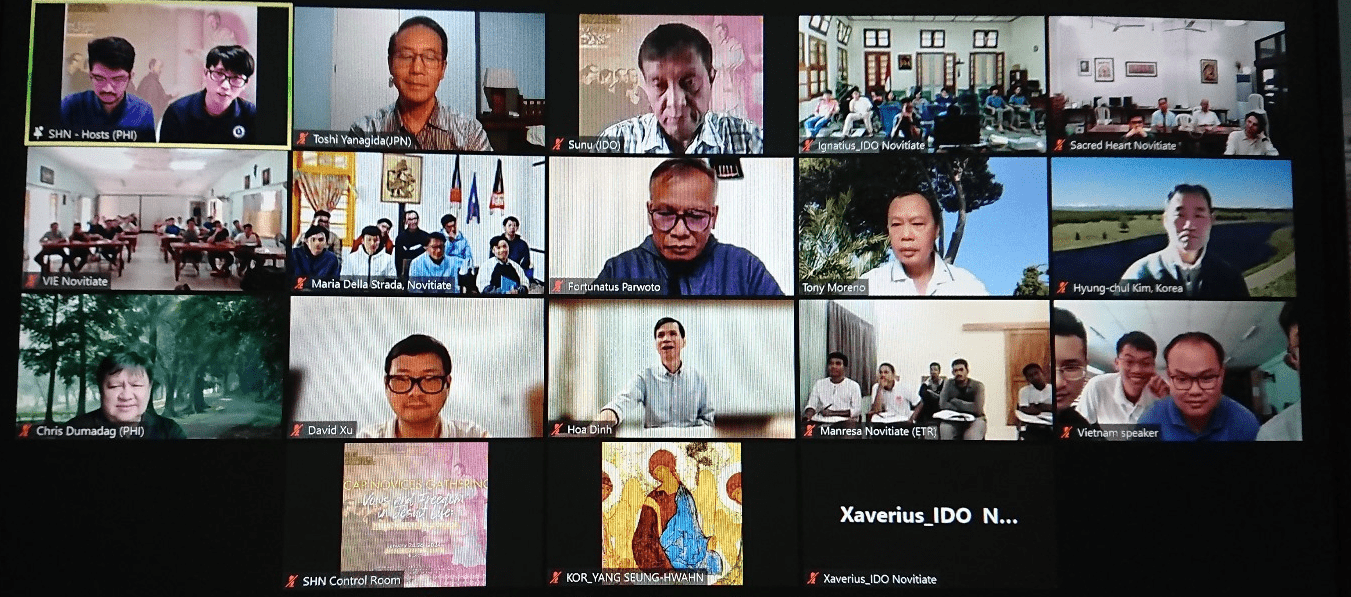 For three days, from 24-26 January, novices from the different provinces across the Jesuit Conference of Asia Pacific (JCAP) gathered online to deepen their understanding of the religious vows, especially in the context of their current stage of formation. Guided by the text of the Society’s Complementary Norms, the gathering’s central focus was how the vows fundamentally make the Jesuit free for the mission (cf. Complementary Norms 143, §2).
For three days, from 24-26 January, novices from the different provinces across the Jesuit Conference of Asia Pacific (JCAP) gathered online to deepen their understanding of the religious vows, especially in the context of their current stage of formation. Guided by the text of the Society’s Complementary Norms, the gathering’s central focus was how the vows fundamentally make the Jesuit free for the mission (cf. Complementary Norms 143, §2).
Spiritual conversations were the primary medium for sharing insights. Outside of the programme proper, the novices were given points for prayer and reflection to deepen and integrate what they had learned from the sessions into their personal prayers. A representative from each novitiate would then share a summary of the fruits of their spiritual conversations, followed by a moment of silence to relish and internalize what had been shared.
In his opening remarks, JCAP Formation Delegate Fr Riyo Mursanto SJ shared three key points. First is the current context, which is being shaped by four factors: the Synod on Synodality, the process of listening to the Spirit through spiritual conversations, discernment in common, and sensing God’s presence through the daily examen. Second is transparency, which entails a certain sense of being open and docile to the Spirit in learning more about the self, growing in personal relationship with God, and knowing the Society of Jesus. All these are oriented towards attaining a growing sense of spiritual freedom. The third key point is cross-conference formation. Fr Mursanto stressed that every Jesuit belongs to the universal Society and that his Province/Region serves only as the door to the global Society. He invited the novices to ask for the grace to grow healthily, that is, to grow in human maturity, because from it comes the grace of growing in the spiritual life and in the freedom to be available for the mission.
 In order to help the novices achieve a richer understanding of their vows and live them out in their fullest sense, two experts were invited to share their insights: Fr Jordan Orbe SJ and Fr Ramon Maria Bautista SJ both from the Philippine Province.
In order to help the novices achieve a richer understanding of their vows and live them out in their fullest sense, two experts were invited to share their insights: Fr Jordan Orbe SJ and Fr Ramon Maria Bautista SJ both from the Philippine Province.
Fr Orbe, a licenced clinical psychologist and psychotherapist, spoke about the psycho-spiritual dynamics of the vows. He explained that in Christian vocation, a dialectic exists between the limitations of human freedom, characterised by ego-centrism and an impaired relationship with God, and self-transcendence, which is the capacity for human partnership with God. This dialectic, as much as it is present in the vocation of all Christians, is also very much present in growth in religious life. While it is true that a person’s needs will always be there as part of human nature, the call to growth often comes from being able to transcend them. This transcendence, however, comes with certain pain points, which become conduits for transcendent movement: the lack brought about by the vow of poverty becomes dependence on God; the longing brought about by chastity is transformed into making space for God; and the limits brought about by obedience are transformed into a heartfelt surrender to God. Thus, there is another dialectic that occurs—that of acceptance and commitment—of accepting the limitations of being human and relying on the grace of God and, on the other hand, of cooperating in committing one’s self by responding to the grace through his own free will. It is through these dialectics, these tensions that one is led to growth in religious life.
Fr Bautista deepened this reflection by expounding on the Jesuit vows of poverty, chastity, and obedience. Fr Bautista, who is co-instructor for the JCAP tertianship programme and has a doctorate in Ignatian Spirituality, explained that the vows from the Jesuit perspective are what make Jesuits free and available. The freedom that is pursued is the freedom to love as one ought and to love like the Lord Jesus. He focused on five key aspects of the vows: canonical, Christic, points of tension, what the vows make us free from, and what they make us free for.
Canonically, each of the vows entails a certain kind of lifestyle. For poverty, it entails living in community and sharing common goods; for chastity, it entails celibacy, which, in giving up the right to a life-long partner, makes the Jesuit more available to be in healthy relationships with others and have a healthy equilibrium in life; for obedience, it entails giving up the right to plan one’s own life in loving trust in his superior who acts in place of Christ. The vows also have Christic aspects in following the example of the life of Christ beautifully encapsulated in the Beatitudes (cf. Mt. 5:3-10). The points of tension for each vow highlight the importance of discernment and staying in the middle of the tension. Ultimately, the vows make the Jesuit free from any attachments that would otherwise hinder him from dedicating himself to the mission, enabling him to give himself fully to service, study, prayer, on-going formation, and community, which are imperative things for religious life.
In closing the three-day assembly, JCAP President Fr Antonio Moreno SJ urged the novices to think about their vows in times when disordered affections and inordinate attachments cloud their judgement, as discernment, too, becomes difficult in this situation. He noted that the vows are possible only when people are free, but that doesn’t mean one has to be free completely and immediately; it is achieved through time in living out the vows. After all, he said, no one becomes a saint after the first vows. The beatitudes call blessed those who are poor and depend on God, who are chaste in their single-minded and undistracted focus on the Lord, and in loving surrender in obedience. In the words of Fr Arrupe, the expression of total freedom is finding oneself totally in the hands of God and being at peace with it.
 Ramon Angelo Lopez is a second-year novice from the Philippine Province. This January gathering of JCAP novices is the sixth since it started in 2021. The attendees came from Sacred Heart Novitiate in Vietnam, Maria della Strada Novitiate in Myanmar, St Stanislaus Kostka Novitiate in Indonesia, Manresa Novitiate in Timor-Leste, and Sacred Heart Novitiate in the Philippines, who hosted this year’s gathering. Along with the novices were their formators.
Ramon Angelo Lopez is a second-year novice from the Philippine Province. This January gathering of JCAP novices is the sixth since it started in 2021. The attendees came from Sacred Heart Novitiate in Vietnam, Maria della Strada Novitiate in Myanmar, St Stanislaus Kostka Novitiate in Indonesia, Manresa Novitiate in Timor-Leste, and Sacred Heart Novitiate in the Philippines, who hosted this year’s gathering. Along with the novices were their formators.

